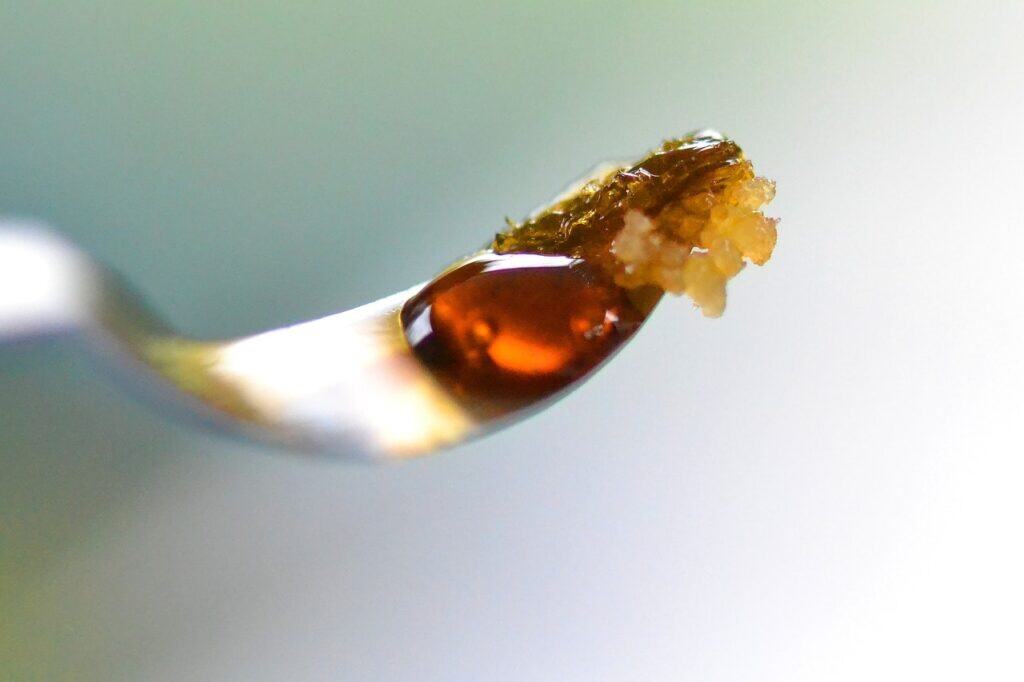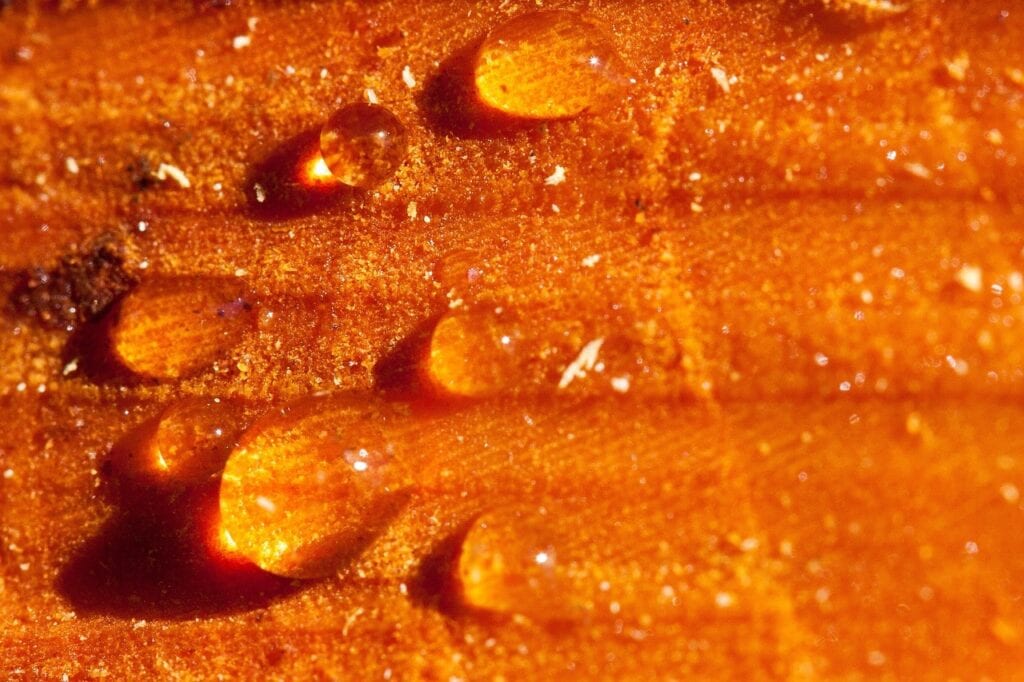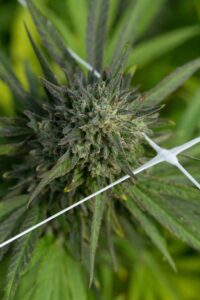
Key Takeaways
- Rosin is a solventless cannabis concentrate.
- It is also known as solventless hash oil (SHO) or live rosin.
- Rosin is extracted from the cannabis plant using heat and pressure.
- This concentrate has a high concentration of THC, making it suitable for experienced users.
- It can be consumed in several ways, such as dabbing, vaping, or infusing into edibles.
- It is also widely used in medical cannabis due to its purity and customizable dosages.
- Rosin requires proper equipment for safe consumption.
Rosin is an easy favourite in the cannabis concentrates market. Why? Unlike other extracts, rosin is crafted using heat and pressure, with no chemicals or solvents. But what exactly is rosin? Why is it popular? How can you use it to elevate your cannabis experience?
What Is Rosin? A Cannabis Extract Explained
This solventless weed extract is made by extracting cannabinoids and terpenes from hemp or cannabis using heat and pressure. Rosin is pure, natural and versatile compared to other solvent-based extracts[1]. Rosin is preferred by users looking for clean cannabis, particularly those who use cannabis medically.
Rosin exhibits amber and translucent qualities and has an array of textures ranging from waxes to pastes. Its popularity has grown rapidly due to its simplicity, purity, and adaptability across different consumption methods. This concentrate is also known as solventless hash oil (SHO) or live rosin.
How Is Rosin Made? The Solventless Process Explained
Rosin can be extracted from several types of cannabis material:
- Cannabis Flower: Thick flowers that have been dried and cured before freezing or that are low in tetrahydrocannabinol can be utilized for flavorful and aromatic extracts
- Kief: Loose trichomes collected from cannabis plants can be pressed into potent rosin.
- Hash: Pressing hash produces hash rosin, considered one of the highest-quality solventless concentrates. Additionally, dry sift hash is another material used to create rosin.
- Hemp: Another way of obtaining rosin is by using low Tetrahydrocannabinol concentrated cannabis
Step-by-Step Rosin Extraction Process
- Prepare the Material: Ensure cannabis is properly cured or, for live rosin, frozen to retain terpenes.
- Place in Filter Bags: The material is placed in a fine mesh filter to keep plant particles out of the final product.
- Extraction: Using a rosin press, the required amount of pressure between 1300 and 1500 psi and temperature between 150°F-220°F to liquidize the hemp resin into rosin. Heating fresh liquid resin is crucial as it transforms the liquid into rosin by vaporizing volatile components, resulting in a semi-transparent, brittle substance.
- Collect the Rosin: The extracted rosin is scraped off and stored.
This simple method makes rosin extraction accessible to home users and professionals alike. To press rosin at home, you can use a common and safe household tool: a hair straightener.
What Are the Types of Rosin?
Flower Rosin
Flower rosin is derived from cannabis buds that are rich in terpenes hence it is quite flavorful. Flower rosin extract is famous with home users as it is relatively easy to use.
Hash Rosin
Made from ice water hash or bubble hash, hash rosin is renowned for its purity and potency. It typically contains over 80% THC, making it a premium product.
Dry Sift Rosin
Pressed from kief or dry sift hash, dry sift rosin strikes a balance between yield and potency. The quality depends on the source material’s purity.
Hemp or CBD Rosin
This rosin is extracted from hemp and has a high concentration of CBD. It is popularly incorporated into edibles, tinctures, topicals, and more. This is great for those seeking low to non-intoxicating cannabis products.
Live Rosin
This extract is derived from fresh-frozen cannabis pants which is different fro the ‘ordinary’rosin which is made from dried cannabis plant material.
Factors That Influence Rosin Quality

What influences rosin quality?
High-quality rosin is often evaluated based on its color, texture, and source material. It commands a higher price due to its cleaner finish and superior extraction methods. The kind of plant material, the amount of time the material stays fresh, and the extraction technique determine the quality of the end product. Other contributing factors include:
Humidity
Maintaining cannabis at 55-62% relative humidity ensures proper extraction and preserves terpenes.
Temperature
Lower temperatures (150°F to 190°F) preserve terpenes and flavor but yield less, while higher temperatures increase yield but may degrade terpenes.
Pressure
Pressure settings between 300 and 1500 PSI depending on the material being used. Too much pressure can compromise the integrity of plant material.
Time
Pressing duration varies from 30 seconds to 5 minutes. Adjusting this variable can optimize yield and quality.
Rosin vs. Resin: What’s the Difference?
- Rosin: Solventless, created using heat and pressure. It retains terpenes and cannabinoids without chemical residues.
- Resin: Extracted using solvents like butane or CO2. While versatile, it may contain residual solvents if not processed correctly.
How to Use Rosin
What are the various ways of using resin?
Dabbing and Vaping
Rosin is ideal for dabbing and vaping due to its purity. It’s heated on a dab rig or vaporizer producing flavorful and potent vapor.
Edibles
Rosin can be infused into oils or butter for making edibles, offering a solvent-free option for cannabis-infused foods.
Topicals
Some balms and creams use rosin for its cannabinoid content, providing localized relief.
Twaxing
Adding rosin to the exterior of a joint or blunt enhances its potency and flavor.
Capsules
Encapsulated rosin provides a convenient and precise way to consume cannabinoids orally.
Why Is Rosin So Popular?
Solventless Purity
The fact that no chemical solvent are found in rosin makes it a safer and cleaner option in fact it lack chemical residue and preserves the structure of the terpenes and the cannabinoids.
Versatility
Rosin’s texture can be manipulated to mimic other concentrates like shatter, budder, or wax, making it suitable for various applications.
High Potency and Quality
Solventess extraction means a higher concentration of cannabinoids and terpenes is achieved, leaving a more robust and true cannabis experience. Good quality rosin is described as having a good clean finish, superior extraction methods, and is often evaluated based on color, texture, and source material.
The Future of Rosin
The global move toward a more natural cannabis culture is influencing the use of rosin and rosin-based materials. With the continued acceptance of cannabis around the world it is expected that rosin will grow in popularity and offer a better option than solvent-based products. Research and innovation will continue to enhance its accessibility and quality.
Conclusion
Rosin represents the perfect blend of purity, potency, and versatility in the world of cannabis concentrates. Whether you’re dabbing, vaping, or exploring edibles, it delivers an elevated experience without the worry of chemical residues.
Frequently Asked Questions
What makes rosin different from other cannabis concentrates?
Rosin is a solventless concentrate, extracted using only heat and pressure, while other concentrates like resin or shatter often use chemical solvents. This makes rosin cleaner and free from chemical residues.
Can I make rosin at home?
Yes, you can. Home users can use a hair straightener for small-scale pressing or invest in a rosin press for better control and yield. Materials like flower, kief, or hash can be used.
Is rosin safe to consume?
Rosin is considered one of the safest cannabis concentrates since it doesn’t involve chemical solvents during its extraction, ensuring purity and natural cannabinoid retention.
What is the shelf life of rosin?
If stored in the dark at cool room temperature, the potency of rosin that is obtained through heating pines and other conifers could last as long as six to twelve months.
How potent is rosin compared to other concentrates?
Just like shatter or wax, which are known to be potent concentrates, rosin has 70-80% cannabinoids.
Is rosin legal?
The legality of rosin depends on cannabis laws in your location. Rosin, which is also derived from pine trees and other conifers, has various applications ranging from industrial uses to its significance in the music industry and potential health effects. In regions where cannabis is legal, rosin is typically permitted.
Can rosin be used medically?
Yes, rosin is often employed by many medical cannabis patients as it has high purity and is free of chemicals. It’s used in pain management, anxiety relief, and other issues[2].
What’s the difference between live rosin and live resin?
Live resin is extract made from fresh-frozen cannabis plants while live resin is a solvent extract created using chemicals such as butane. Live resin is cheaper to make than live rosin or rosin.
References
- “You got to love Rosin: Solventless dabs, pure, clean, natural medicine.” exploring Twitter data on emerging trends in Rosin tech marijuana concentrates. (n.d.). PMC Home. https://pmc.ncbi.nlm.nih.gov/articles/PMC5803369/
- Watson, S. (2016, June 14). Medical marijuana FAQ. WebMD. https://www.webmd.com/a-to-z-guides/medical-marijuana-faq








